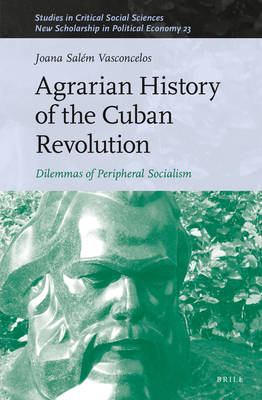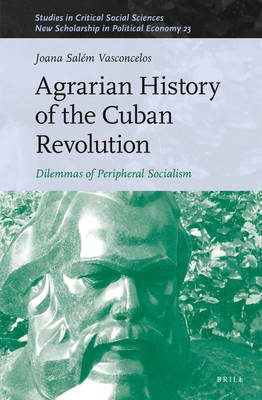
- Afhalen na 1 uur in een winkel met voorraad
- Gratis thuislevering in België vanaf € 30
- Ruim aanbod met 7 miljoen producten
- Afhalen na 1 uur in een winkel met voorraad
- Gratis thuislevering in België vanaf € 30
- Ruim aanbod met 7 miljoen producten
€ 299,45
+ 598 punten
Omschrijving
In Agrarian History of the Cuban Revolution, the Brazilian historian Joana Salém Vasconcelos presents in clear language the complicated challenge of overcoming the condition of Latin America's underdevelopment through a revolutionary process. Based on diverse historical sources, she demonstrates why the sugar plantation economic structure in Cuba was not entirely changed by the 1959 Revolution.
The author narrates in detail the three dimensions of Cuban agrarian transformation during the decisive 1960s -- the land tenure system, the crop regime, and the labour regime --, and its social and political actors. She explains the paths and detours of Cuban agrarian policies, contextualized in a labour-intensive economy that needs desperately to increase productivity and, at the same time, promised widely to emancipate workers from labour exploitation. Cuban agrarian and economic contradictions are well-synthetized with the concept of Peripheral Socialism.
The author narrates in detail the three dimensions of Cuban agrarian transformation during the decisive 1960s -- the land tenure system, the crop regime, and the labour regime --, and its social and political actors. She explains the paths and detours of Cuban agrarian policies, contextualized in a labour-intensive economy that needs desperately to increase productivity and, at the same time, promised widely to emancipate workers from labour exploitation. Cuban agrarian and economic contradictions are well-synthetized with the concept of Peripheral Socialism.
Specificaties
Betrokkenen
- Auteur(s):
- Uitgeverij:
Inhoud
- Aantal bladzijden:
- 356
- Taal:
- Engels
- Reeks:
- Reeksnummer:
- nr. 249
Eigenschappen
- Productcode (EAN):
- 9789004538290
- Verschijningsdatum:
- 30/03/2023
- Uitvoering:
- Hardcover
- Formaat:
- Genaaid
- Afmetingen:
- 155 mm x 234 mm
- Gewicht:
- 670 g

Alleen bij Standaard Boekhandel
+ 598 punten op je klantenkaart van Standaard Boekhandel
Beoordelingen
We publiceren alleen reviews die voldoen aan de voorwaarden voor reviews. Bekijk onze voorwaarden voor reviews.










